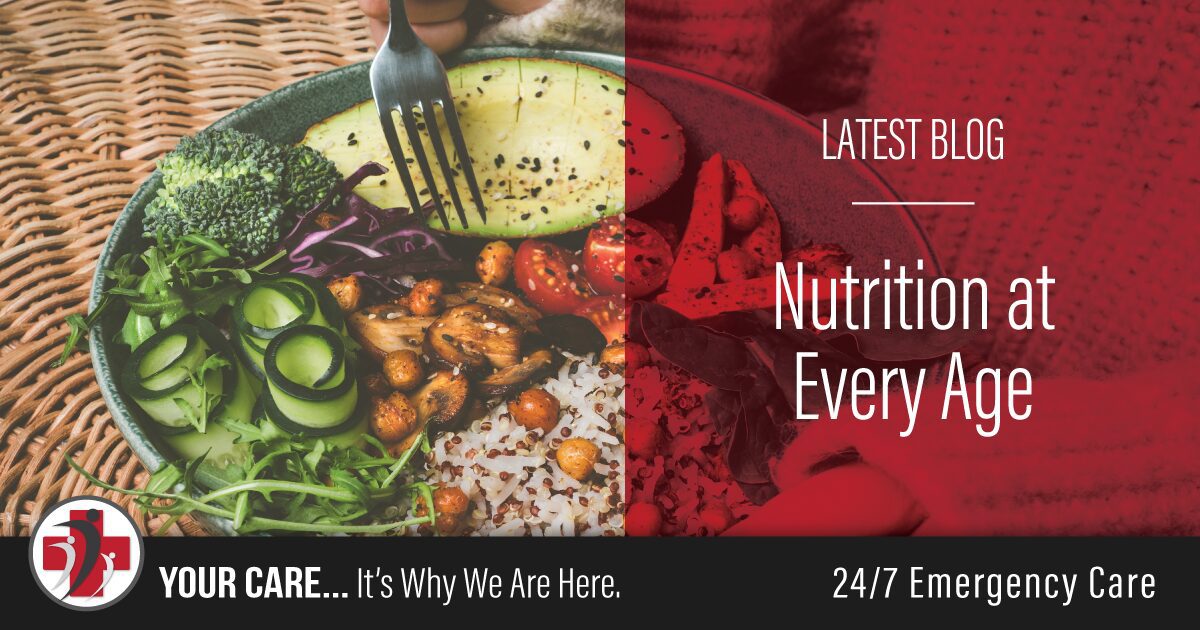Nutrition at Every Age

We spend a lot of our time with patients discussing nutrition and food. Not only do people tend to have questions about whether certain foods are appropriate for their current health situation, but we believe good nutrition is the building block for a healthy lifestyle and important to talk about. Some nutrition advice is appropriate for almost everyone, such as eating ample fruits and vegetables, drinking enough water, and subbing out whole grains for white flour products. However, there are some important things to consider regarding your best choices for food and drinks depending on your age.
This month, we’d like to provide some advice on age-specific nutrition in Fountain Hills. It’s truly never too early nor too late to practice good nutrition, and there are things to consider at every age. Our goal is that you’ll never stop helping yourself and your loved ones make informed nutritional choices.
- Young children will often eat more food through snacking than they do at mealtime, so it’s important to make every snack count. Consider the snacks you offer and whether they actually contribute to nutritional goals rather than merely serve as empty calories. Also, your kids will learn by example, so make sure you’re modeling great nutritional habits. Oh – and what about kids who go through a picky stage? Studies show that it can take up to 15 times of being offered a new food before kids eat it – so keep it up!
- For teenagers, getting enough calcium, iron, and vitamin D is important to fully support this period of rapid growth and development. Sugar reigns supreme in a lot of what many teens consume, so talk with your child about being mindful of the sugar content in their foods and drinks. Teenagers should also prioritize eating regular meals each day. While it can sometimes be hard to make time for breakfast, eating at least three meals per day can help regulate emotion, brain function, and physical energy.
- As adults, we can find ourselves in eating ruts, choosing the same few meals over and over again. For optimal health, aim to eat a variety of foods. Incorporating healthy fats (such as from nuts, avocados, olives, fish), plenty of fresh vegetables, whole grains, and lean protein can provide you with a welcomed increase in energy. It’s important to keep in mind that good nutrition is a life-long practice, and it can take time to change your habits, enjoy the healthier foods, and notice a difference in how you feel. Keep up the good work; you’ll be glad you did.
- Senior citizens should prioritize getting enough protein to maintain muscle, and fiber to maintain digestive tract health. It’s also important for seniors to get enough B-12, which helps with nerve function, bone health, and blood health. B-12 can be found in beef, liver, fortified foods, and some dairy products. However, many find it difficult to get enough B-12 through foods alone, so we suggest you talk with your medical team at Fountain Hills Medical Center to see if a B-12 supplement is appropriate for you.
Fountain Hills Medical Center is here for all your nutrition advice in Fountain Hills. While we are able to help with most nutrition-related needs, we also maintain a referral network of supportive health services to ensure you’re getting the treatment you need. Your lifelong good health is our priority, and we’re here to help you every step of the way.
SOURCES
- Nutrition Tips for Kids – familydoctor.org
- Healthy eating for adolescents | nidirect
- Healthy Eating During Adolescence | Johns Hopkins Medicine
- Healthy Eating for Adults | MyPlate
- Healthy Meal Planning: Tips for Older Adults | National Institute on Aging (nih.gov)
- Vitamin B-12 Supplements Recommended for Older Adults – Mayo Clinic News Network




